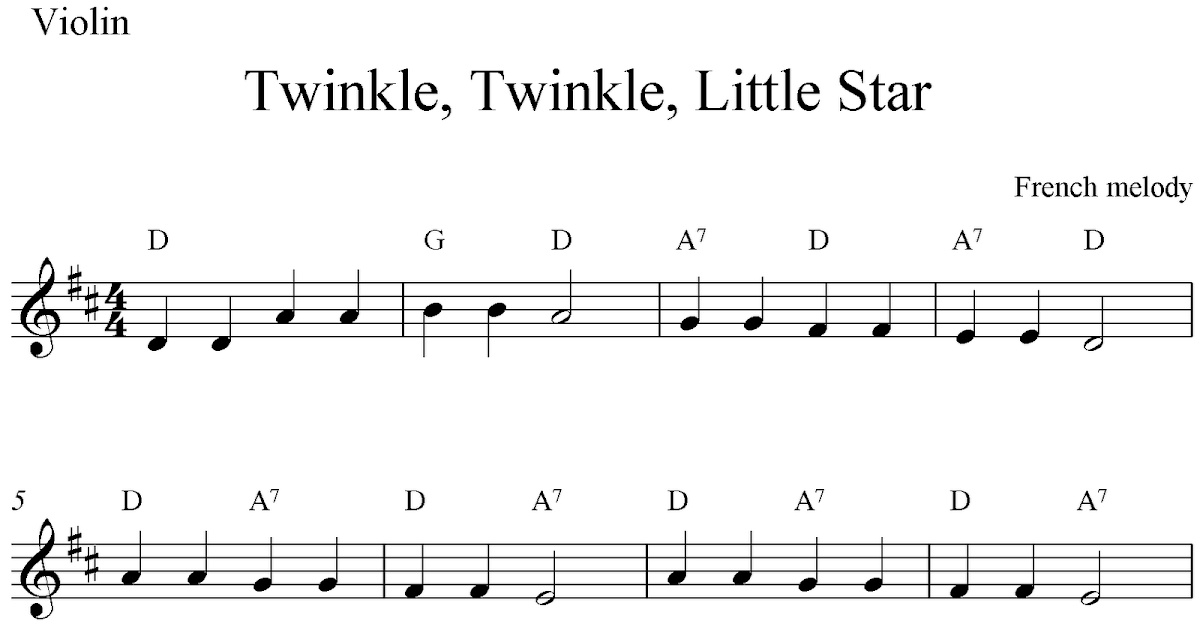

Twinkle twinkle little star piano notes how to#
I think he needed 10 minutes to figure out how to play the basslines on tuba, without any prior brass experience. Especially that one kid that didn't had any musical instrumental experience before the course and you would e able to put him on different instruments and he would figure them out. We had kids in the beforementioned orchestra project that would be able to figure out instruments quiet fast by themselves. Some people just get certain things faster. In the end i feel the a bigger factor will be the person approaching it. But I also would trust some people to figure it out on violin faster than 40 hours. I definetly did other kids songs that go up to the sixth even within 30 minutes with the right person (didn't needed to be former musician). I feel I could teach somebody playing that tune within an hour in a somewhat horrible version on the saxophone. I would have totally different numbers in my head anyways. To be honest it can differ from person to person so much, that I am not sure in the end. Maybe it is because I am a woodwind teacher (my sister played violin so I did try to play on it every once in a while and i work in an orchestra project where we teach kids who never played an instrument before, and they start right from nowhere directly into orchestra - most of them playing strings), but I feel the gap between wind and strings should be smaller. I think string instruments are a little more visible in what they suppose to do. the most important parts on what to do are invisible if you'll watch somebody play the instrument. If we were to say that the person can't draw from an educational source, then the challenge will become much harder on wind instruments. It also depends on the person learning but I want to give my reasoning why. the slightest mistake can make the instrument not making any tone and figuring that mistake out is the hard part.ĭepending on the exact circumstances of this challenge I feel wind instruments are a little harder than this estimation. tone production can be tricky, because some people just get it and others have more trouble. Giving the nature that the tune goes up to a sixth, that could also pose some figuring out the tone - much more on flute than on single reeds. Without them I think the fingering is still harder than the other ones, because holding the instrument in a stable position is definetly significantly harder. If we talking about the ones with the holes in the pads, that will take much longer, because the fingers have to be clean at all times. First of all the question is what type of flute.

I think just by pure comparison flute doesnt check out with sax/clarinet. The time it takes to play one simple song doesn't reflect the holistic difficulty of the instrument, just how accessible it is to beginners. To master each of these instruments is a lifelong process. Most of these are transposing, and while their fingering is the same across their respective families, they'll be different from each other in terms of what fingering corresponds to a given note on the page. If you want to add being able to read the music for each of these as well, that'll take extra time. Violin and cello are slightly more approachable than viola and bass in terms of tone production and fingering.

To be extra optimistic, though, maybe 30-50 hours to get to a point where someone can recognize what you're trying to play with relative ease. It takes many years of regular work to get both of these to a point where its listenable. Here the challenge is tone production and fingering. At least 20 hours for these ones to get a reliably half-decent tone and sort out some basic fingering patterns. The difficulty of these are not as renowned, but tone production is quite difficult and fingering can be complicated. Maybe 10-20 hours, maybe longer to really get the slide positions on trombone for one single simple piece. They have straightforward fingering, but embouchure is important, especially for flute.įrench horn is trickier to produce a good tone than trombone, but trombone doesn't have set fingering. From there it's relatively straight forward to find the fingering. Sax and clarinet take a few hours all in to start getting a useful tone from the reed from scratch. Piano, guitar, and harp won't take long, maybe a few minutes to noodle around and find the notes, and the production of the actual tone is very straight forward. On most of the above, tone production is the challenge. I have played all these, except trombone and bassoon, though my brother played those and I can relate his experience there.


 0 kommentar(er)
0 kommentar(er)
